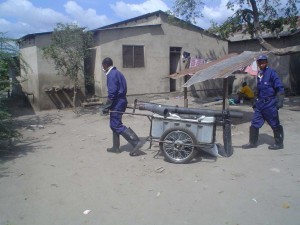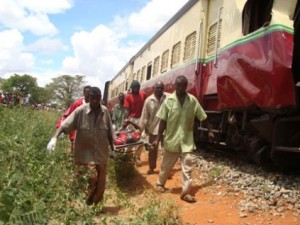Of the 3 million people living in Dar, around 13% discharge their effluent into a sewer, another 13% have a septic tank and 74% rely on pit latrines. A “good” latrine is permanent, clean and with a porcelain bowl within a walled and roofed area. Such latrines, which are available only to the better off, cost around US$350. Others are more basic and vary in depth from 1 – 3 metres. The median number of users per latrine is 7 adults, which suggests that there are around 300,000 pit latrines in Dar.
Because the pit is of a fixed volume, it will inevitably fill up and need emptying – which costs up to US$80. Formal ways of doing this include draining into a parallel pit – this option is usually cheaper, but not effective for sludge removal, emptying manually (using a bucket) or sucking out with a vacuum tanker – although in the unplanned areas there is rarely vehicular access to latrines. Officially the responsibility of the landlord, few landlords are interested in paying for pit emptying and the reality is that it is often left to the tenants. As many lack the funds, or have other more immediate priorities, many resort to “flooding out” during periods of heavy rain – when the contents are simply allowed to spill out into the general (often open) drainage. Apart from many pits being full, where the water table is high or where the soil is sandy and walls collapse, sewage seeps into, and pollutes, the groundwater.
Health Hazard
These unsanitary conditions are reflected in high levels of oral-faecal transmitted diarrhoea diseases. The 2004 Demographic Health Survey found that 7% of children under five in Dar es Salaam had experienced diarrhoea in the two weeks prior to data collection and the Ministry of Health report that 60-80% of hospital admissions are due to sanitation-related diseases. Temeke Municipality report that 97% of out-patients attending health centres were suffering from sanitation-related diseases. Between 1998 and 2005 close to 7000 cases of cholera have been reported in the city (MoH 2006). Thus sanitation in Dar es Salaam remains a primary public health concern.
The Costs
As is often the case, the poorest pay most for basic services. Whilst those on mains sewers pay TShs 300 per m³ for complete disposal of their sewage (having paid nothing for the construction of the sewer lines), those with septic tanks and pit latrines pay TShs 1,000 and TShs 1,700 per m³ respectively just for the cost of dumping into the lagoons. Add in the cost of emptying and transporting to the lagoon (excluding the cost of building the tank/latrine in the first place) and the cost increases to TShs 7,500 per m³ for a tank and TShs 70,000 per m³ for a latrine! It is not surprising that most people find an easier way to dispose of the contents of their latrines.
Emptying and Transporting
There have been a number of attempts to empty the latrines and transport the contents to the lagoons. There are two quite different elements – emptying/sucking out and transporting. Transporting long distances should be done in large volumes, but equipment needs to be small to be able to manoeuvre in the small spaces between the houses. Most dual-purpose equipment has failed – perhaps good at sucking out but too slow on the road. However, a new approach has emerged – which separates extraction from transport – and builds on the way in which solid (household) waste is disposed. It was developed by Steven Sugden of the London School of Hygiene and Tropical Medicine and Water Aid, working with officials in Temeke Municipal Council.

Operators on their way to service a pit latrine (photo by John Meadley)
The Gulper
The Gulper – developed by Steven and a dairy farmer in Yorkshire – is a simple but effective piece of hand powered equipment that sucks the top 800 mm of sludge out of the latrine into (enclosed) buckets, which are hand carried to a waiting cart.
In the early 2000s, a new franchise system for the collection of solid waste was introduced into Dar. The franchisees were originally large companies with trucks, which tended to focus on the planned areas where collection was easier. In the unplanned areas the work has been done increasingly by individuals using the ubiquitous hand carts – which can carry up to 300kg of solid waste and which take the waste to collection points, from where it is transported to the landfill sites which are now located outside the city. By adding a plastic tank the conventional push cart can be converted into a small tanker to transport the sludge to the treatment lagoons. As there is clearly a limit to how far someone can push a cart weighing 300kg, the possibility of building a number of transfer tanks is being investigated – which can hold the sludge for 2-3 days until there is enough to justify emptying by vacuum tanker.
These are still early days. The gulper works well and is likely to be replaced by a modified and more efficient one. With the combined cost of a Gulper and a modified pushcart being around US$500, the cost of starting a small business is reasonably affordable. Charging TShs 18,000 for removing 300 litres of sludge, a two-man team can make a reasonable living emptying two latrines per day. The main constraints are people’s willingness to pay and the distance to the lagoons. The cost of emptying could be subsidised through a voucher scheme – why should the poorest pay most for the disposal of their waste? – whilst discussions continue with the local authorities. It is possible that in the coming years an increasing number of latrines will be emptied by small operators who both make a living for themselves and create a healthier environment. Ironically, the capital cost of providing enough gulpers, carts and transfer tanks to remove 300 litres from 30% of the latrines in Dar each year is less than US$300,000 – too small to interest most international donors!
John Meadley






